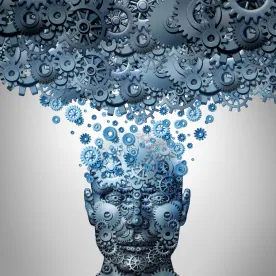This week’s episode focuses on artificial intelligence in the workplace:
“AI,” or artificial intelligence, has been a buzzword for as long as any of us can remember. But now AI is entering the workplace at a rapid pace. As the technology gets more sophisticated and useful, employers are facing new challenges. Michelle Capezza has more:
“With the changes in automation and artificial intelligence being introduced into the workplace, employers really need to strategically plan for the future and determine what the future composition of their workforce will be. If they're looking to fully automate departments, for example, or particular jobs, they may need to consider a serious workplace transition policy, as they need to move certain employees into different roles or actually transition individuals out of the company. They might need to consider severance programs, voluntary retirement programs, job sharing, virtual telecommuting, and flexible work arrangements, and even consider how they might reskill and retool their existing employees to prepare them for the new roles they may have to undertake, working alongside a machine in a cobot type of a relationship.”
Another area of concern is the impact of the future workforce on labor union relations. Adam Forman has more:
“For those who have a union relationship already, employers need to keep in mind that the introduction of new AI technologies are a mandatory subject of bargaining, and, absent language in their contract reserving the right to unilaterally implement, they need to bargain over the implementation with the union. For those employers who do not have a union, they need to be mindful that fear and anxiety of employees may lead them to go to a union and try to organize with the belief that it could save their otherwise soon-to-be-outsourced job.”
The human workforce can also feel threatened by changes in benefits and compensation. Employers should consider taking proactive steps in this area to ensure a positive work environment, as Michelle Capezza let us know:
“One of the top concerns for employers definitely will need to be to determine what will be the right balance of benefits and compensation for the future workforce. We are going to see a need for a highly skilled worker, someone who adds value as a human when there are certain jobs being performed by machines for some of the more routine tasks.”
Adam Forman has more:
“As with most HR best practices, there's no one-size-fits-all strategy for employers who are looking to implement AI in the workplace. There are, however, several universal factors that most employers should consider. The first is the team that's going to be implementing it. It's important to have a multidisciplinary team made up of HR, legal, and the business and operational units. Next, it's important to do your due diligence. Analyze the vendor contracts and the algorithms to ensure that they're compliant with labor employment law. And after you've implemented, it's important that you aggressively monitor the technologies to assure that they are not having an unintended consequence or perhaps exposing your organization to liability or things such as disparate impact or some other type of unlawful discrimination.”



 />i
/>i
